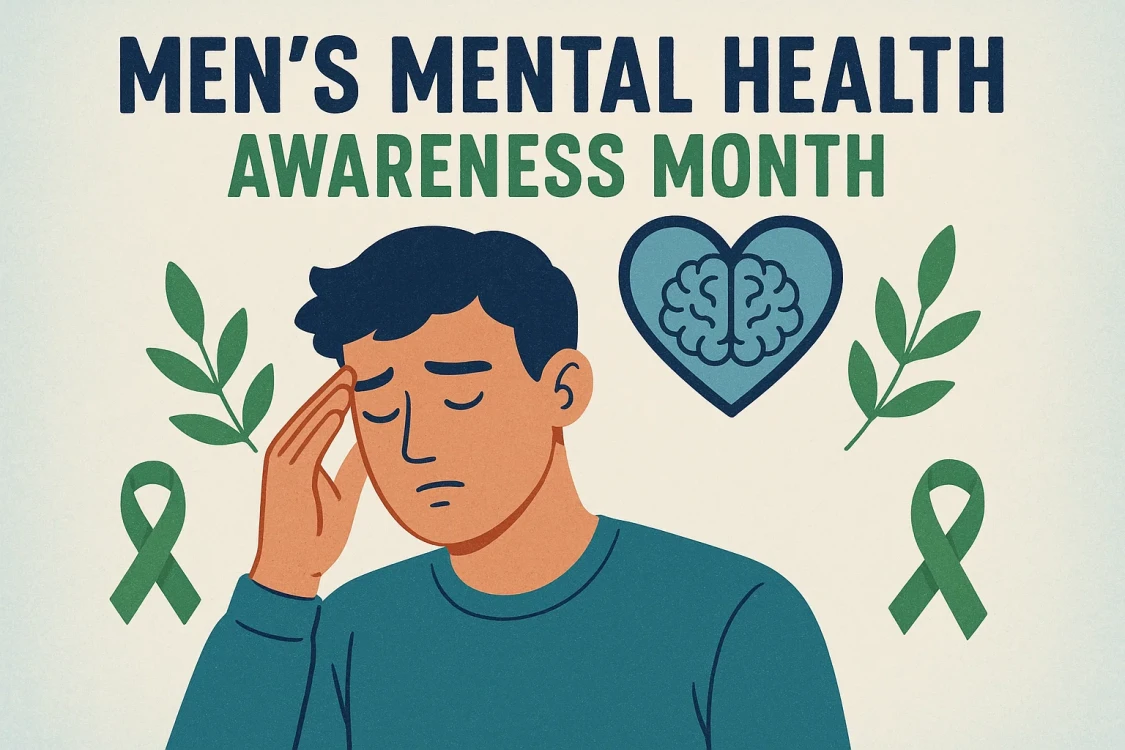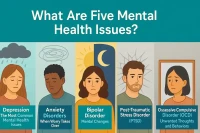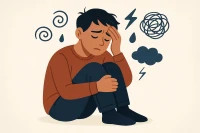The talk about mental health has changed a lot in the last ten years. Still, one group faces special challenges in getting help. Men's Mental Health Awareness Month shows that mental well-being matters for everyone, regardless of gender. It’s vital to create safe spaces for men to share their struggles.
Men face unique barriers to mental health support, despite progress in reducing stigma. Cultural norms and views on masculinity influence how people see strength and vulnerability.
This guide covers Men's Mental Health Awareness Month. It explains its origins and importance. You’ll find practical ways to support the men in your life. No matter if you’re a healthcare provider, family member, or friend, this awareness period is key. It can help improve men’s mental wellness for everyone involved.
What Is Men's Mental Health Awareness Month?
June is men's mental health awareness month. It's time for communities, organizations, and individuals to tackle the mental health challenges men and boys face. This annual observance highlights how mental health issues appear in men and the need for targeted support systems.
The awareness month began because traditional mental health methods often overlook men's needs. When is men's mental health awareness month? This question comes up each year as more people see the value of this observance. June is Men's Mental Health Awareness Month activities happen in communities around the world.
Men's Mental Health Awareness Month 2025 builds on years of advocacy. Mental health experts noted concerning trends in how men use mental health services. The movement gained momentum when stats showed clear gaps in treatment-seeking between men and women.
The main goals of National Men's Mental Health Awareness Month are to:
- Reduce stigma.
- Raise awareness of how mental health issues affect men.
- Highlight available resources and treatment options.
- Encourage open talks about male mental wellness in families, workplaces, and communities.
Men's Mental Health Awareness Month stats show that campaigns are making a real impact. Participation in mental health programs among men increased by 23% in communities that support this month. Emergency mental health interventions fell by 15% in places with strong awareness efforts.
Why Men's Mental Health Needs Special Attention
Research shows men face unique challenges in getting mental health care and sticking with treatment. These gaps show why June's Men's Mental Health Awareness Month is important for healthcare providers and families.
Men are much less likely than women to seek help for mental health issues. Only 35% of men with depression or anxiety seek treatment. In contrast, 58% of women with the same symptoms do. This treatment gap leads to worse mental health and a higher risk of crises.
Men's mental health awareness month shows troubling statistics. These trends highlight the need for focused awareness efforts. Men's suicide rates are nearly four times higher than women's. Middle-aged men face the greatest risk. Men make up about 75% of all suicide deaths in the U.S. This highlights the urgent need for suicide prevention during awareness month.
Substance abuse can be a way for men to cope with untreated mental health problems. Research shows that men are twice as likely to develop substance use disorders if they have untreated depression or anxiety. This pattern presents tough treatment challenges. It needs special methods to tackle mental health and addiction issues at the same time.
Cultural and social factors strongly shape how men see and manage mental health. Traditional masculine roles often discourage emotional expression and help-seeking behaviours. Men usually feel pressure to seem strong, self-reliant, and emotionally stable. This pressure can make it hard for them to see mental health issues or get the help they need.
Workplace cultures can either support or hinder men's mental health help-seeking behaviours. Industries with traditionally male-dominated workforces often perpetuate stigma around mental health discussions. Men's mental health awareness month activities at work have had positive impacts. Companies have seen more employees using assistance programs and a better mental health culture.
Common Mental Health Issues in Men
Depression in men often shows up differently than in women. This can result in missed diagnoses and a lack of proper treatment. Women often show sadness and cry when they feel depressed. Men often show depression by being irritable, angry, aggressive, or emotionally distant.
Male depression may appear as risky behaviors, substance use, workaholism, or social isolation. These symptoms might look like character flaws. However, they are signs of a treatable mental health condition. Healthcare providers highlight the importance of noticing these signs during Men's Mental Health Awareness Month 2025.
Anxiety disorders impact millions of men. However, these issues often go unnoticed. This is mainly because anxiety symptoms appear differently in men. Men with anxiety frequently display physical symptoms. These can include muscle tension, headaches, digestive problems, or sleep issues. They may not show the typical worry and fear usually linked to anxiety disorders.
Post-traumatic stress disorder (PTSD) impacts many men, especially military veterans and first responders. It also affects those who have gone through traumatic experiences. Men's mental health awareness month resources often focus on PTSD support. Many men struggle to link traumatic experiences with lasting mental health issues.
Substance abuse disorders frequently co-occur with mental health conditions in men. People may use alcohol, prescription drugs, or illegal substances to self-medicate. They often do this for issues like depression, anxiety, or trauma symptoms. This dual diagnosis needs a complete treatment plan. It must tackle both mental health and addiction issues.
Suicide risk represents one of the most serious mental health concerns affecting men. Men's mental health awareness month stats reveal that men die by suicide more often than women. However, women try to take their lives more frequently. Spotting warning signs and risk factors is crucial for families, friends, and healthcare providers.
Signs of Mental Health Struggles in Men
Recognizing mental health symptoms in men means knowing they can appear in unique ways. Emotional signs can show up as irritability, anger, and mood swings. You might feel emotionally numb or lose interest in hobbies. Social withdrawal from family and friends is also common.
Men with mental health issues may display emotional ups and downs that seem extreme. They may get upset over little things, show road rage, or seem distant from family and friends. These emotional shifts often point to underlying depression or anxiety, not personality flaws.
Physical symptoms often appear with mental health issues in men. They can be the main way these struggles show.
Common signs are:
- Constant headaches
- Unexplained aches
- Digestive issues
- Sleep problems
- Fatigue
- Changes in appetite
- Low energy levels
Men may feel stress through physical symptoms. These can include chest tightness, muscle tension, or getting sick often. This happens because stress can weaken the immune system. Men usually seek medical help for physical issues, even if they avoid discussing mental health directly.
Behavioral changes can provide important clues about men's mental health status.
Warning signs are:
- Increased substance use
- Risky behaviors
- Social isolation
- Decreased work performance
- Neglecting personal hygiene or responsibilities
- Changes in sleep patterns
Some men might dive into work or exercise to cope with mental health issues. Others may pull away from everyday activities. Changes in communication, like being very quiet or fidgety, can reveal hidden mental health problems.
Men's mental health awareness month activities often focus on education. They help families and communities notice when men may face mental health challenges.
How to Support Men's Mental Health During This Month
Supporting men's mental health takes effort and understanding. We must recognize the unique challenges men encounter. June is Men's Mental Health Awareness Month. This is a great time to start support strategies. These can have a lasting impact all year long.
Encouraging open conversations represents one of the most powerful ways to support men's mental health. Start by modeling vulnerability and emotional openness in your own interactions. Share your mental health experiences when it feels right. Show that asking for help is a sign of strength, not weakness.
When discussing mental health with men, don't push too hard. Also, avoid making assumptions about their experiences. Create chances for natural talks and listen without judgment when they share. Sometimes simply being present and available makes a significant difference.
Workplace support initiatives can significantly impact men's mental health outcomes.
Companies can support Men's Mental Health Awareness Month by:
- Hosting educational workshops.
- Sharing information about employee assistance programs.
- Offering mental health days.
- Creating peer support networks.
Leadership plays a crucial role in workplace mental health culture. When managers and executives discuss mental health, it makes others feel safe. This encourages them to focus on their own wellness. Sharing experiences shows that it's okay to focus on mental health without worrying about job risks.
Community-based support programs offer valuable resources for men seeking mental health assistance. In 2025, many communities will host support groups for Men's Mental Health Awareness Month. They will provide mental health screenings, educational workshops, and fun activities. These will help encourage social connections.
Religious groups, community centers, sports leagues, and volunteer organizations can help spread mental health awareness and support. The key is to meet men where they already gather. Please don't wait for them to find traditional mental health services.
Men's Mental Health Awareness Month offers many resources. You can find national hotlines, online support groups, and mobile mental health apps. Local counseling services are also available. Sharing this information during awareness month makes it easy for men to find support when they need it.
Ways to Get Involved in Men's Mental Health Awareness Month
You can get involved in Men's Mental Health Awareness Month in many ways. You can raise awareness through simple activities or join community organizing efforts. Every contribution helps build greater understanding and support for men's mental health needs.
Social media awareness campaigns play an increasingly important role in mental health advocacy. Join in by sharing quotes, stats, and resources for Men's Mental Health Awareness Month. Use the right hashtags! Sharing personal stories can lower stigma and inspire others to ask for help.
Making original content, such as blog posts, videos, or infographics on men's mental health, helps spread awareness. Focus on practical info, share resources, and bust myths about men and mental health.
Community event participation offers hands-on opportunities to support men's mental health awareness. Many groups host walks, runs, workshops, and fundraising events in June. This is for Men's Mental Health Awareness Month. Attending or volunteering at these events shows support and helps build community connections.
If events don't exist in your area, consider organizing your own awareness activities. You could host a mental health discussion group. Set up a lunch and learn at work. Another option is to partner with local healthcare providers for mental health screenings.
Fundraising and donation efforts support organizations working specifically on men's mental health initiatives. Find reliable groups focused on male suicide prevention, men's therapy, or mental health research for men. Even small donations combined with others can make significant impacts.
You can volunteer with:
- Crisis hotlines
- Support groups
- Community mental health centers
- Advocacy organizations
Many organizations train volunteers and welcome anyone who wants to help with men's mental health.
Educational initiatives help spread awareness about men's mental health issues and available resources. You might organize presentations at schools, community groups, or professional associations. Focus on practical information that attendees can use to support the men in their lives.
The Role of Healthcare Providers and Treatment Options
Healthcare providers are key in meeting men's mental health needs. This is important during men's mental health awareness month and all year long. Primary care doctors are often the first to see men with mental health issues. This makes their role in spotting and referring patients very important.
Training healthcare providers to see how mental health symptoms show up differently in men helps improve diagnosis and treatment results. Men's mental health awareness month stats show that gender-specific training for providers boosts diagnosis rates by 31%. Treatment engagement also improves a lot.
Therapeutic approaches may need modification to engage male clients effectively. Many men benefit from solution-focused therapies and cognitive-behavioral approaches. They respond well to group therapy. It works best when it's less formal than traditional one-on-one counseling. Adding physical activity, outdoor settings, or hands-on elements can boost engagement for some men.
Medication management represents an important component of mental health treatment for many men. Generic medications like sertraline, fluoxetine, and bupropion provide affordable options to treat depression and anxiety. Understanding insurance and affordable treatment helps men access the medications they need. This way, financial barriers won’t stop them.
Employee assistance programs offer valuable mental health resources specifically designed for working adults. Many men prefer workplace mental health programs over individual therapy. These programs provide short-term counseling, crisis support, and referrals for long-term treatment.
Telehealth services now make it easier for men to access mental health care. This helps those who might otherwise avoid getting treatment. Online therapy platforms, virtual support groups, and remote psychiatric consultations make it easier for men to access mental health services. They break down barriers that often kept men from seeking help.
Crisis intervention services require special considerations for men's mental health needs. Men's mental health awareness month highlights the need for crisis support. This support should be trained in male communication styles and risk factors. Suicide prevention efforts should focus on the methods and risk factors that are most common in men.
Supporting Families and Caregivers
Family members and caregivers are key to helping men recover their mental health and stay well. June is Men's Mental Health Awareness Month. It's a chance to teach families how to support the men in their lives. They can also focus on their own mental health needs.
Noticing mental health signs in men helps families decide when to get professional help. Families should show concern but also respect autonomy. They should avoid pushing too hard or assuming things about someone's mental health.
Family communication strategies include:
- Actively listening without rushing to fix problems.
- Avoiding judgment or criticism.
- Asking open-ended questions about feelings and experiences.
- Consistently expressing care and support.
Family education on mental health conditions, treatment options, and recovery helps set realistic expectations. This knowledge fosters supportive home environments. Many families benefit from attending support groups specifically designed for people who have loved ones with mental health conditions.
Caregivers must prioritize their own mental health while supporting others. Caring for someone with mental health challenges can really stress family members. Seeking support, setting personal boundaries, and practicing self-care are key for lasting well-being.
Men's Mental Health Awareness Month often features family-focused events. These activities help families understand and tackle mental health issues together. These programs understand that mental health impacts everyone in a family, not just the person with a diagnosis.
Moving Forward Beyond Awareness Month
Men's mental health awareness month highlights key issues, but real change needs ongoing effort all year. The awareness from June should lead to ongoing action and support for men’s mental health needs.
Year-round advocacy efforts help maintain the momentum built during the awareness month.
This could involve:
- Continuing social media campaigns
- Organizing community events regularly
- Advocating for policy changes to improve men's mental health care
- Supporting groups focused on men's mental health initiatives
Men's Mental Health Awareness Month in 2025 and future years will build on past lessons. Tracking outcomes, getting feedback from participants, and changing approaches based on what works best can improve awareness efforts over time.
Research and data collected during awareness months help us understand men's mental health needs. They also guide effective intervention strategies. Taking part in surveys, sharing your experiences with researchers, and supporting research projects all help strengthen the evidence for future programs.
Policy advocacy represents another important avenue for creating lasting change. Supporting laws for mental health parity, increasing funding for men’s mental health programs, and addressing treatment access barriers benefit men in the long run.
Gendrics main goal of Men's Mental Health Awareness Month is to make conversations about men's mental health normal. It also wants to create communities where men feel supported in focusing on their mental wellness. This cultural shift needs ongoing effort. Individuals, families, communities, and institutions must work together toward shared goals.
Conclusion
Men's Mental Health Awareness Month highlights that mental wellness matters for everyone. It also reminds us that men have specific challenges when seeking help. By understanding these challenges, communities can work together. This teamwork helps create lasting positive changes in how men manage their mental health.
Men's mental health statistics show serious issues. They also point to chances for real help and support. When men get the right mental health care, things improve a lot. This helps not just the men but also their families, jobs, and communities.
June is Men's Mental Health Awareness Month. It’s a time to focus on these important issues. But real change needs ongoing commitment all year long. Everyone can help improve men's mental health. This can happen through personal talks, community work, professional growth, or advocacy.
The men in your life might be quietly facing mental health issues. They often seem strong and successful on the outside. Stay informed about men's mental health. Recognize warning signs and know how to offer support. You can make a big difference in someone's recovery journey.
If you're a man facing these symptoms or challenges, asking for help takes courage and strength. Mental health treatment is effective. There are affordable options and support systems to help you through any obstacles.
Men's mental health awareness resources are available year-round. You can find help from crisis hotlines, online support groups, healthcare providers, and local organizations. Seek support before a crisis hits. Remember, taking care of your mental health helps everyone who cares about you.





Comments